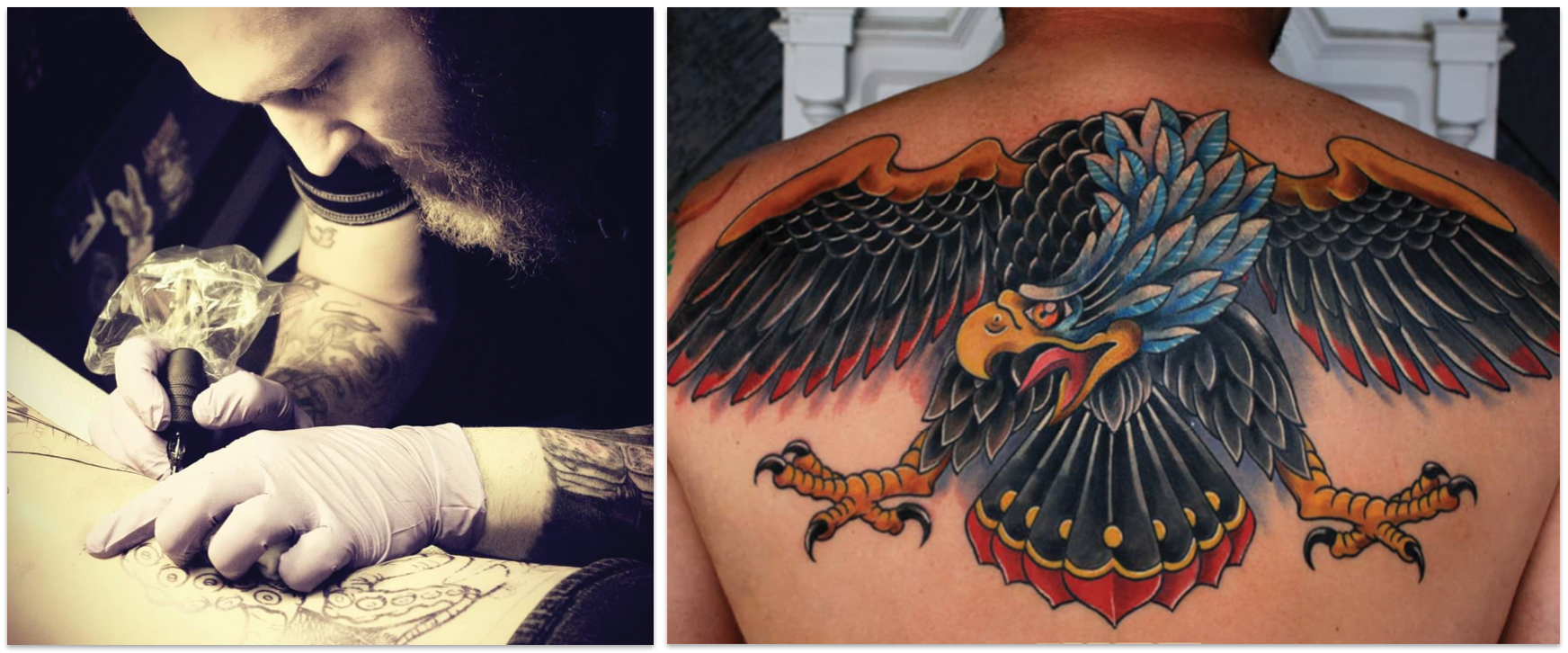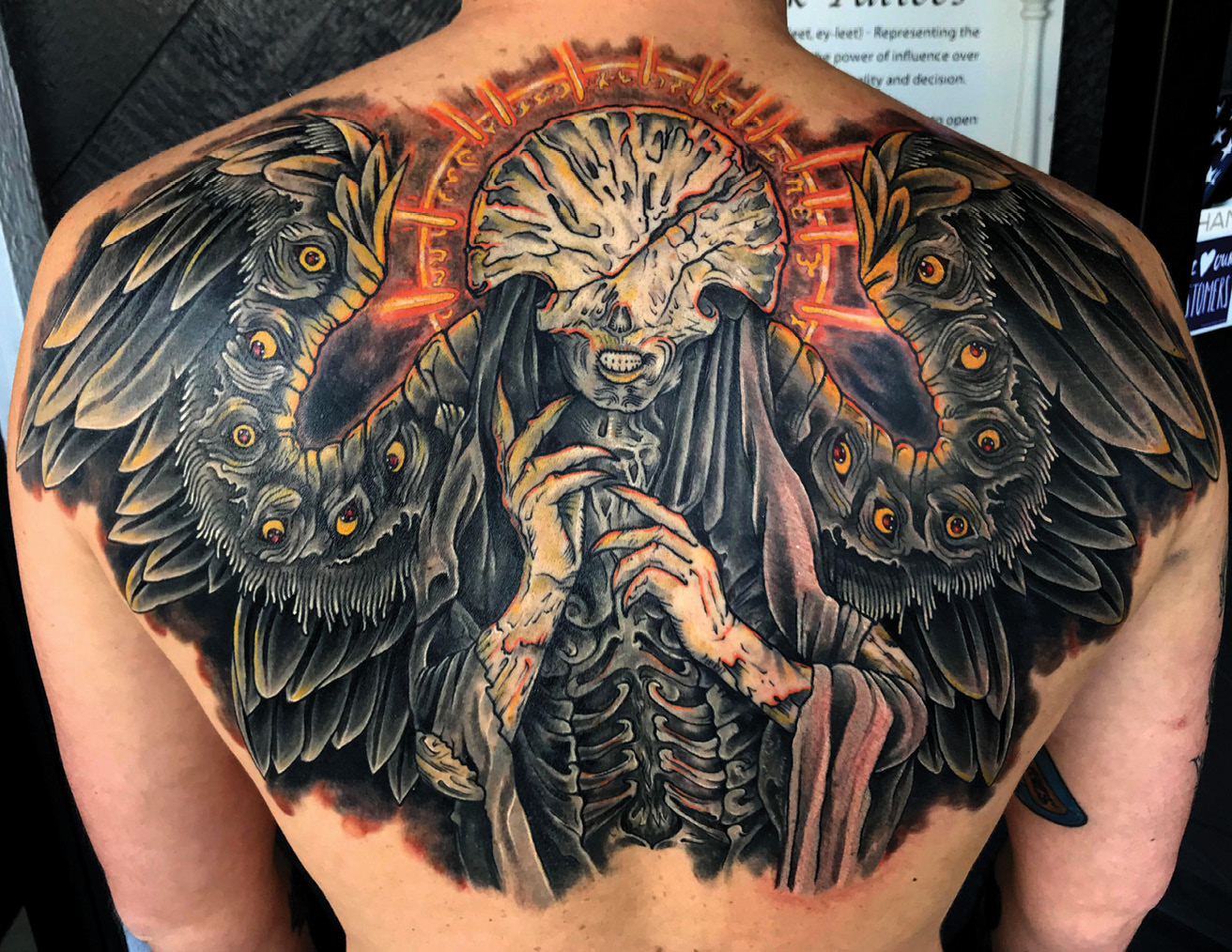Tattoo artist Joe Winkler embodies the profile of a mainstreamed industry

Any rookie walking into Elite Ink Tattoos might experience a blended sense of déjà vu: the atmosphere echoes simultaneously a gym, a salon, a bar and a boutique. Those searching for a context that corresponds with dated stereotypes about tattoo parlors won’t find one. Instead, this shop projects the mainstream funky-cool-yet-professional environment that’s come to define the current tattoo industry.
Joe Winkler is the 2020 tattoo artist incarnate. A Citadel graduate with a degree in civil engineering, Winkler found in Elite Ink Tattoos a way to blend his passion for art with his love for math and physics. Add a dose of personality and a dash of discipline—both of which Winkler possesses in spades—and the engineer established a new career that’s creatively challenging and endlessly rewarding.
A crumbling economy led to Winkler’s professional transformation. He worked for a Myrtle Beach-area engineering firm after graduating from the Citadel in 2008, yet was laid off within the year during the national recession. Winkler started working construction with his father’s company, but the artist in him was getting impatient, and his friends and family encouraged him to explore his talent.
“They knew I’d always had an interest in art, but you’re never sure if you want to make your passion your career, because you might lose your love for it if you’re required to do it all the time,” said Winkler.
Winkler’s road to apprenticeship at Elite Ink Tattoos started with time and tenacity. After becoming a frequent client and friendly with the artists, he inquired about an apprenticeship, but was denied. For the next 18 months, he spent every free moment either being tattooed or drawing at the table in the lobby.

“He just kept coming back and coming back, and someone would say, ‘Who the hell is that guy over there drawing?’” said John “Hank” Spencer, who would eventually become Winkler’s primary mentor. “He would ask, ‘Can I apprentice? Can I apprentice?’ and finally we said ‘yes.’”
Spencer, who has been tattooing for 27 years and was an original artist at Elite Ink Tattoos when it opened in 2006, said common misconceptions about the work are the reason tattoo artists are skeptical about bringing on apprentices.
“We’ve had some that would start and they would figure out it wasn’t a big party, and so they’d leave all of a sudden, in the middle of an apprenticeship,” said Spencer.
Winkler, now six years into the industry, agrees with the approach.
“Tattooing is very demanding,” said Winkler. “I’m here from 10 a.m. to 8 p.m., tattooing all day, and then I go home and draw for two or three hours. It doesn’t stop with the shop. If you’re going into it like, ‘I’m a tattoo artist, isn’t that cool?’ then you’re not in it for the right reasons. You should be passionate, and you should be dedicated.”
In addition to artistic talent and commitment, Winkler said people skills are another element essential to the business.
“You’re going to be dealing with people; it’s a hospitality thing,” said Winkler. “You need to be approachable, personable, good with talking to people. You’re going to be close to them, touching them, changing their bodies for the rest of their life, so you have to be understanding of what both parties are going through.”
Jim Devlin, a Calabash, N.C., resident and longtime client who has nearly a dozen tattoos of Winkler’s handiwork, confirmed both the importance of interpersonal dynamics and the time commitment of the endeavor on both sides of the needle.
“Joe’s one of those guys that’s easy to spend time with,” said Devlin, “and that’s important, because you know you’ll be together for hours and hours. It’s a lot more tolerable with someone like Joe because he knows what he’s doing, he’s got a light touch, and he knows how to tune his machines, which makes a difference”
Devlin was pleased with the experience when Winkler tattooed his entire back.

“It took about six or seven sessions, and it was 25 hours of tattooing,” said Devlin. “Joe was able to do the entire outline in one sitting, so that was about eight or nine hours, and the environment in there is pretty cool, too, so that makes it easier.”
Winkler’s background in engineering is on full display in his new career, according to Devlin.
“His mind is built in such a way that someone can come to him with an idea that other tattoo artists might view as strange or bizarre, but he can visualize it because he has that background,” said Devlin. “He’s tailor made for the consultation stage of the tattoo. You can verbalize to him what you want, and he’ll be able to make it happen.”
As the tattoo industry has become more mainstream over the years, the clientele and the size of the art has shifted a great deal.
“In the beginning, my clientele was mainly male—bikers, Harley riders, some construction guys,” said Spencer. “Now, about 70 percent of my clientele is women.”
Spencer also noted the size and scale of tattoos.
“The standard used to be smaller ones that were less than the palm of our hand and most took about an hour. Now we’re doing sleeves most of the time, back pieces, stuff like that, and eight-hour sessions are typical.”
Now that he’s found his calling, Winkler is in the tattoo industry for good.
“I want to do this forever,” said Winkler. “A lot of people are not fortunate enough to find something they really want to do. It’s something I enjoy doing, and I’m good at it, so I want to put everything I’ve got into it.”